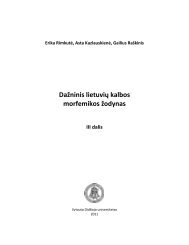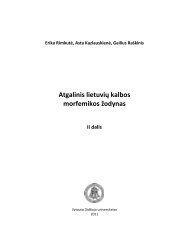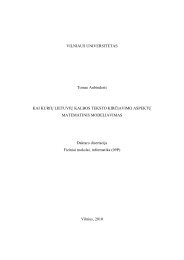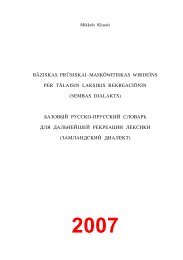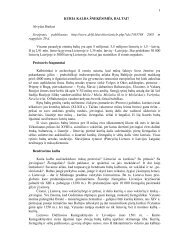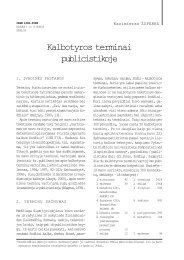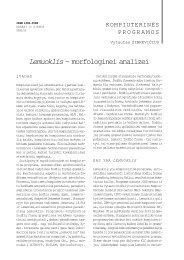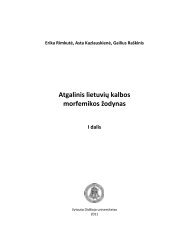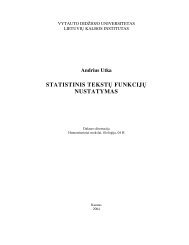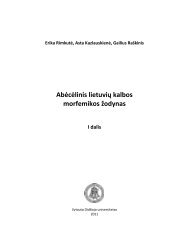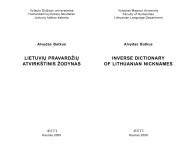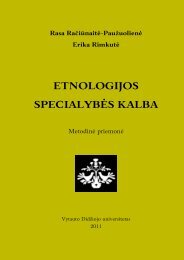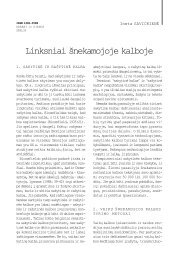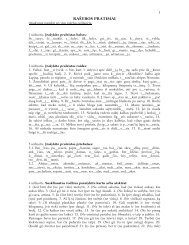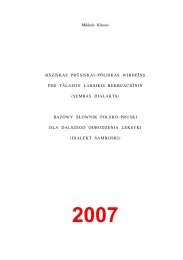HISTORICAL GRAMMAR OF OLD PRUSSIAN
HISTORICAL GRAMMAR OF OLD PRUSSIAN
HISTORICAL GRAMMAR OF OLD PRUSSIAN
You also want an ePaper? Increase the reach of your titles
YUMPU automatically turns print PDFs into web optimized ePapers that Google loves.
<strong>HISTORICAL</strong> <strong>GRAMMAR</strong> <strong>OF</strong> <strong>OLD</strong> <strong>PRUSSIAN</strong><br />
became palatalized (D’), spelled as -ti-, -di-, e.g.: median (E) ‘forest’,<br />
crixti`nai (III) ‘Christians’ etc. Pr. gçide (III) ‘waits’ ends in -de coming<br />
from *-d’a < *dja.<br />
The same is after gutturals, cf. dragios (E) ‘yeast’ with -gi- reflecting<br />
Pr. *-g’- (< *-gj-).<br />
* 24. Pr. *r + *j and *l + *j turned into palatalized Pr. *r’, *l’. The<br />
latter are spelled ri, ry, rg and resp. li, lg, lig, e.g.: (E) garian ‘tree’, karyago<br />
‘military campaign’, *kargis ‘army’ (PEÞ II 119), angurgis ‘eel’ (with -rg-<br />
= Pr. *-r’-) etc., kelian ‘lance’ (with -li- = Pr. *-l’-), ansalgis ‘welt’ (with<br />
-lg- = Pr. *-l’-, cf. PEÞ I 81), saligan ‘green’ (with -lig- = Pr. *-l’-, cf. PEÞ<br />
IV 43).<br />
* 25. Pr. *s with subsequent *j turned into *ð, or *ð’, (spelled sch)<br />
before back vowels, e.g.: schuwikis (III) ‘shoemaker’, acc. fem. schan /<br />
schian (III) ‘this’ etc.<br />
* 26. Balt. *• > Pr. *v. This Pr. *v is spelled with the letter w in<br />
most instances in written documents, cf. Deiws (III) ‘God’, Deywis (E)<br />
‘idem’. Accidental spellings with the letter u reflect its non-syllabic pronunciation,<br />
i.e. *• or *-(u)• (cf. Endzelîns SV 34 f.), e.g.: (I) gen. Deiuas<br />
‘idem’, acc. Deiuan ‘idem’, (E) preartue ‘reutel, plough-knife’ (PEÞ III<br />
346), schutuan ‘twisted yarn’ (PEÞ IV 88).<br />
Letters -ff- in spelling dr¾offs ‘faith’ render the same spirant Pr. *-v-.<br />
Prothetic Pr. *v- [*•-] is not rare, cf. woasis (E) ‘ash-tree’ (PEÞ IV<br />
259), wosux (E) ‘he-goat’ (PEÞ IV 265 f.), wuschts (I) ‘eighth’ etc.<br />
* 27. Pr. *s comes either from Balt. *s < IE *s, or (as well as Latv.<br />
s) from Baltic *ƒs (> Lith. ð) < IE *k.<br />
Pr. *z (as well as Latv. z) comes from Balt. *ƒz (> Lith. þ) < IE *g.<br />
Pr. *s and *z are spelled with the same letter s in written documents.<br />
For Pr. *s < Balt. *s cf. soûns (III) ‘son’, snaygis (E) ‘snow’ etc.<br />
For Pr. *s < Balt. *ƒs cf. sunis (E) ‘dog’ (cf. Lith. dial. ðunÑs ‘dog’) etc.<br />
For Pr. *z cf. semo (E) = *zçm¯É ‘winter’ < *z…eim¯É < *ƒzeim` etc.<br />
23



